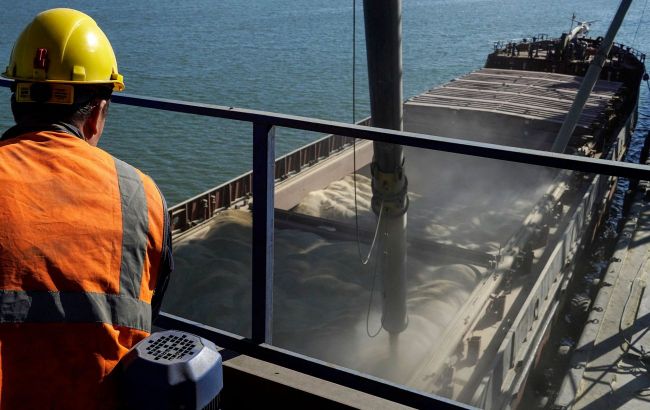Threat to ports: Reasons behind Izmail strikes, and who can halt grain attacks
 Russia's attacks aim to hinder Ukraine's food exports (Photo: Getty Images)
Russia's attacks aim to hinder Ukraine's food exports (Photo: Getty Images)
Russia attacked the southern part of the Odesa region with Shahed drones overnight. This time, the enemy targeted Ukraine's main inland port in Izmail, located across the Danube River, resulting in the destruction of tens of thousands of tons of grain and leading to a surge in global food prices.
Why did Russia choose Izmail as the target this time? Should we expect further attacks, and how to stop the "grain war" initiated by the aggressor country? Oleksandr Musiienko, the head of the Center for Military-Legal Studies, explains.
Attack on Odesa region. Target - Izmail port
The Russian army launched another massive attack on Ukraine overnight. The enemy used Shahed drones and once again targeted Ukraine's port infrastructure in their usual manner. This "grain war" initiated by Russia has been ongoing since Moscow decided to withdraw from the Black Sea Initiative.
Once again, the Odesa region experienced terror from the occupiers. The enemy struck warehouses and grain elevators in the region. The port of Izmail suffered the most significant damage. It serves as one of the alternative routes for exporting Ukrainian grain.
"Nearly 40,000 tons of grain intended for Africa, China, and Israel have been damaged. The port of Izmail was the most affected. The maritime terminal and infrastructure of Ukrainian Danube Shipping, a key Ukrainian cargo carrier on the Danube, were damaged," wrote Vice Prime Minister of Ukraine Oleksandr Kubrakov, commenting on the new Russian attack.
According to Reuters, the nighttime attack by Russia on the port of Izmail resulted in a significant spike in food prices. Wheat prices on the Chicago exchange jumped 5% after the attack and later rose by 1.2% to $6.60 per bushel.
The attack targeted the main internal port of Ukraine in Izmail, which serves as a crucial alternative route for exporting Ukrainian grain. The destruction of nearly 40,000 tons of grain, destined for Africa, China, and Israel, caused serious damage to the port's infrastructure, including the maritime terminal and the Ukrainian Danube Shipping Company, a key Ukrainian cargo carrier on the Danube.
The Purpose of the enemy's actions
An expert suggests that these attacks should be seen as an attempt by the enemy to destroy Ukraine's economic infrastructure, particularly the ports used for grain exports under the "grain deal" and other agreements.
"As is known, Ukraine has not withdrawn from the 'grain deal' and remains committed to the principles and obligations it has undertaken. Therefore, even in the face of attacks on port infrastructure, Ukraine is trying to find ways to ensure grain exports. On the other hand, Russia seeks to block all these efforts," says Musiienko.
Apparently, the Kremlin sees that Ukraine is considering alternative options for food exports through the Danube ports, which are not covered by the "grain deal" and have been operational even before the Black Sea initiative was agreed upon. And now, Ukraine is trying to maximize grain exports through these routes.
"Naturally, as there aren't many options for shipping currently, Russia has decided to destroy everything to demonstrate that the 'grain deal' won't work, and they will do everything to prevent Ukraine from fulfilling its obligations under these agreements. These attacks are also intended to cause economic losses for us," explains the expert.
In essence, Russia wants to demonstrate that without its cooperation, fulfilling any agreements and ensuring normal navigation in the Black Sea is supposedly impossible.
Reports of "ships breaking the blockade" to the ports in the Odessa region could have provoked the Russians.
Interestingly, yesterday, there were reports circulating on social media and in the media that three foreign ships had allegedly ignored the Russian "blockade" and entered a Ukrainian port under the supervision of NATO aircraft.
These were three cargo ships belonging to Greek, Israeli, and Turkish-Georgian companies. They supposedly arrived at one of the Ukrainian grain terminals in the port of Izmail on the Danube Delta on July 30. They were dubbed as "the first foreign ships to arrive at Ukrainian ports after Russia withdrew from the 'grain deal.'"
Later, this information was debunked by the media, emphasizing that the Danube ports were not part of the "grain deal," so there could be no breaking of a Russian blockade.
However, Natalia Humeniuk, the spokesperson for the Southern Ukraine Defense Forces, stated that this information could have provoked the enemy into the attack that happened last night. According to her, this "artificial bomb" targeted the Danube ports.
"What was related to those ships, around which an information frenzy was created, indirectly provoked the same attack that took place today. Attracting such attention, using information in hybrid warfare, leads precisely to increased aggression. We need to be very cautious," said Humeniuk.
She explained that there was no blockade breakthrough, as the ships were following the recommended course, using territorial waters of other states and outside the area declared closed.
The expert, Musiienko, also did not rule out that the information about the "breakthrough" of three ships and the activation of attacks might be related.
The risks of further attacks on grain shipments are high, according to the interlocutor. At least until the meeting between Türkiye President Recep Tayyip Erdoğan and Russian dictator Vladimir Putin. As it was agreed today, the Kremlin leader is still planning to visit Türkiye.
So, until there is clarity after the Putin-Erdoğan meeting, it's unlikely that we can talk about reducing the volume of attacks, Musiienko noted.
In this situation, the expert emphasized that Ukraine needs to strengthen its air defense capabilities to preserve food exports amid the Russian terror.
"Increasing the number of air defense systems is the only option available today, which can provide opportunities for grain exports through the ports," says Musiienko.
Additionally, Ukraine should continue seeking alternative routes wherever possible, as the Ukrainian government is currently doing.
After missile and drone attacks on Odesa and ports along the Black Sea coast, the Russians have now turned to terrorizing the Danube ports. Most recently, on July 24, the occupying country struck the port of Reni. The UAV attack resulted in the destruction of three grain warehouses and injured seven people (port workers). More details about this attack can be found in the RBC-Ukraine material.

